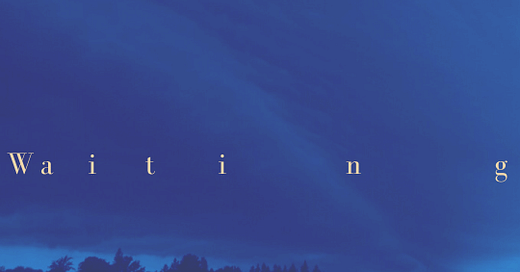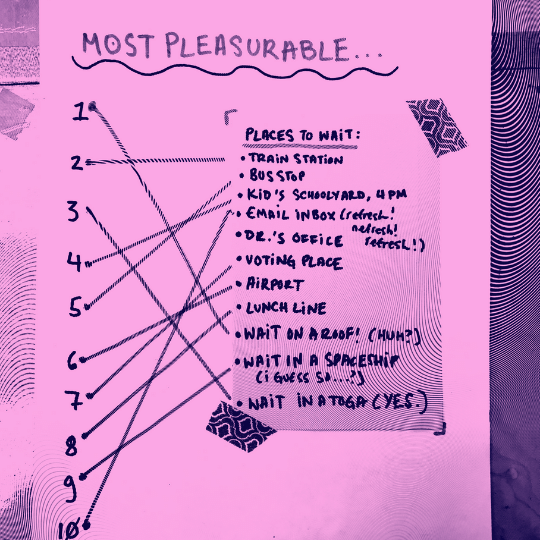Many of us have been counting down the days to things we don’t have a lot of control over — the inauguration, a vaccine, a return to “normal.” Waiting has many facets, from anticipation to dread. We wait for the arrivals of babies, buses and books and we wait for the doctor’s call, the layoffs to be announced, the numbers to come in.
Waiting is what happens when we allow ourselves to not be busy, and attend to what is at hand — and that which isn’t. It can be uncomfortable because being busy is our cultural default mode.
In his book, Geography of Time, psychologist Robert Levine wonders if we share the same sense of time across cultures. He uses the term “hurry sickness” to describe what happens when people feel compelled to rush even in the absence of real external time pressures. He argues that it’s a disease, one that leads to health problems and the fragmentation of relationships.
When we are busy we tend to rush waiting, especially now that we all clutch our little time-filling devices in our hands. Has our digital world caused our waiting muscles to atrophy? Is it possible that our great-grandparents knew what to do with themselves while their letters were ferried across time and space by steamships and horses? Was the pleasure of the letter commensurate with the wait? Now, we expect a near instantaneous reply, willing the blinking ellipses of a text message to turn into words in front of our eyes. We have become busy waiters.
Time is a “Silent Language” says anthropologist Edward Hall. As children, we pick up social concepts of early and late; waiting and rushing; of the past, the present and the future. In many cultures, waiting for the right moment is a sign of mastery. A wait in Mexico is different from a wait in New Mexico. Depending on where we live, a long bus ride could be three hours or it could be three days.
And then there are the epic waits, the ones we remember and study. Nelson Mandela was in prison for 27 years, waiting out most of that time Robben Island, never sure that he would be released. He and his comrades smuggled books and newspapers, wrote letters to lawyers and loved ones, sang and negotiated with their jailers, and they made appointments with one another to keep time structured. That 27-year wait was the space in which Mandela grew into the leader we remember today.
What kind of pleasure do you find in those moments between now and the moment when we experience that which we want/don’t want to experience?
And, we are wondering...
Is there something you are proud of? And if so, is it, by chance, something that you waited for?
SJJ - and the TPR Team
Over here at The Pleasure Report, we have some thoughts on how to make waiting a more pleasurable experience.
Hydrate.
Play, day dream, eavesdrop, pretend to tightrope walk on the cracks of the sidewalk, strike up a conversation, let a conversation be struck.
Don’t try to make time go faster. You can’t. And definitely don’t check to see if the bus is on its way.
The wait is really just the sweet spot between what is and what could be. And this applies in the sexual realm as well. In edging, the sexual practice of delaying climax, the space between — all that beforeness — is where the most pleasure lies. It’s a lovely way to tone those waiting muscles.
Photographer Nina Katchadouria made this series of photos on a long-haul flight from San Francisco to Auckland with nothing but a roll of toilet paper. Just saying.
If we apply ourselves toward the outcome we desire, it has the exponential effect of affecting the results while passing the time meaningfully. #GetOutTheVote
Waiting to speak is not the same as listening.
Olivia Hockenberry, contributing editor:
There is a well-known Dr. Seuss poem called The Waiting Place that has stayed with me.
You can get so confused
that you'll start in to race
down long wiggled roads at a break-necking pace
and grind on for miles cross weirdish wild space,
headed, I fear, toward a most useless place.
The Waiting Place…
I knew that waiting was important and that I would be rewarded for doing it well. It was frustrating. To a kid, an hour feels like a lifetime.
...for people just waiting.
Waiting for a train to go
or a bus to come, or a plane to go
or the mail to come, or the rain to go
or the phone to ring, or the snow to snow
or the waiting around for a Yes or No
or waiting for their hair to grow.
Everyone is just waiting.
But it was also a time when I was free to do whatever I wanted. I made up stories in my head while dinner was being made. At the bus stop, I listened to the women chatting behind me and imagined I was a part of their conversation. During commercial breaks, my siblings and I passionately argued about the outcome of the TV show we were watching.
That moment between A and B allowed us to explore endless possibilities.
Waiting for the fish to bite
or waiting for the wind to fly a kite
or waiting around for Friday night
or waiting, perhaps, for their Uncle Jake
or a pot to boil, or a Better Break
or a string of pearls, or a pair of pants
or a wig with curls, or Another Chance.Everyone is just waiting.
If you have ever waited for a fish to bite you know how engaged your body is and how vigilant you are. Waiting for the wind to fly a kite is a thrill. The anticipation of Friday night makes the week worth it. It is in waiting that we get to create our ideal worlds, to revel in anticipation.
From the Institute of Pleasure Studies:
Ear Hustle is a podcast about the daily reality for inmates inside California’s San Quentin State Prison while waiting to be released.
Songs to listen to while in a line:
“Waiting” by Alice Boman
“Waiting” by Green Day
“Waiting on the World to Change” by John Mayer
“The Waiting” by Tom Petty and the Heartbreakers
Waiting at the MET
Waiting Chairs, Gabriel Orozco Mexican, 1998
Waiting Room, Isabelle Greenberger, 1935–43
From the Lexicon of Pleasure
In Spanish, a word for “waiting” (esperar) also means “to hope.”
We’ve been waiting for the right moment to introduce you to our other team member, India Kotis. We will let her introduce herself.
IK: I was born in the Year of the Ox, and raised in the city that never sleeps. After attending film school for one year, I changed course and graduated with a B.A. in Anthropology from Kenyon College in 2020. Working with people who are committed to fostering a more expansive, body-centered, and pleasure-grounded paradigm of daily life has been wholly inspiring. I am interested in the dime store pleasures of the everyday [hot shower; dance break; the scent of fall air], the sparkly, dazzling pleasures you remember for years to come [artistic inspiration; the sudden, irrefutable presence of the divine; limerence], and the most luminous, life affirming pleasure of all [love; love]. I am interested in heterodoxy, New York City history, and why and how the meanings of things change. I am passionate about context. I love to cook. I love to bike. I love my friends.
VLADIMIR: That passed the time.ESTRAGON: It would have passed in any case.
VLADIMIR: Yes, but not so rapidly.
—SAMUEL BECKETT, Waiting for Godot
Thank you for spending this time with us. We will be back next week with more investigations of pleasure.
If you haven’t yet subscribed (free, monthly, annual), please join us. You’ll get special features and be the first to know.
If you are enjoying this newsletter, please tell a friend.






